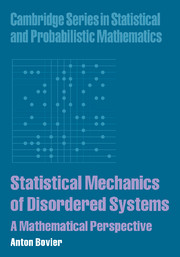Book contents
- Frontmatter
- Contents
- Preface
- Nomenclature
- Part I Statistical mechanics
- 1 Introduction
- 2 Principles of statistical mechanics
- 3 Lattice gases and spin systems
- 4 Gibbsian formalism for lattice spin systems
- 5 Cluster expansions
- Part II Disordered systems: lattice models
- Part III Disordered system: mean-field models
- References
- Index
1 - Introduction
Published online by Cambridge University Press: 25 January 2010
- Frontmatter
- Contents
- Preface
- Nomenclature
- Part I Statistical mechanics
- 1 Introduction
- 2 Principles of statistical mechanics
- 3 Lattice gases and spin systems
- 4 Gibbsian formalism for lattice spin systems
- 5 Cluster expansions
- Part II Disordered systems: lattice models
- Part III Disordered system: mean-field models
- References
- Index
Summary
L'analyse mathématique, n'est elle donc qu'un vain jeu d'esprit? Elle ne peut donner au physicien qu'un langage commode; n'est-ce pas là un médiocre service, dont on aurait pu se passer à la rigueur; et même n'est il pas à craindre que ce langage artificiel ne soit un voile interposé entre la réalité et l'œil du physicien? Loin de là, sans ce langage, la pluspart des analogies intimes des choses nous seraient demeurées à jamais inconnues; et nous aurions toujours ignoré l'harmonie interne du monde, qui est, nous le verrons, la seule véritable réalité objective.
Henri Poincaré, La valeur de la science.Starting with the Newtonian revolution, the eighteenth and nineteenth centuries saw with the development of analytical mechanics an unprecedented tool for the analysis and prediction of natural phenomena. The power and precision of Hamiltonian perturbation theory allowed even the details of the motion observed in the solar system to be explained quantitatively. In practical terms, analytical mechanics made the construction of highly effective machines possible. Unsurprisingly, these successes led to the widespread belief that, ultimately, mechanics could explain the functioning of the entire universe. On the basis of this confidence, new areas of physics, outside the realm of the immediate applicability of Newtonian mechanics, became the target of the new science of theoretical (analytical) physics. One of the most important of these new fields was the theory of heat, or thermodynamics. One of the main principles of Newtonian mechanics was that of the conservation of energy. Now, such a principle could not hold entirely, due to the ubiquitous loss of energy through friction.
- Type
- Chapter
- Information
- Statistical Mechanics of Disordered SystemsA Mathematical Perspective, pp. 3 - 8Publisher: Cambridge University PressPrint publication year: 2006

